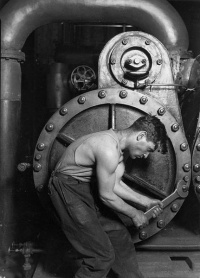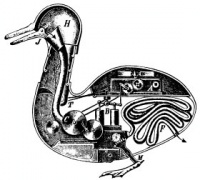Machine
From The Art and Popular Culture Encyclopedia
|
"But I can see you!" she exclaimed. "What more do you want?" |
_-_Julien_Offray_de_La_Mettrie.jpg)
|
Related e |
|
Featured: |
A machine is a tool consisting of one or more parts that is constructed to achieve a particular goal. Machines are powered devices, usually mechanically, chemically, thermally or electrically powered, and are frequently motorized. Historically, a device required moving parts to classify as a machine; however, the advent of electronics technology has led to the development of devices without moving parts that are considered machines.
The word "machine" is derived from the Latin word machina, which in turn derives from the Doric Greek μαχανά (machana), Ionic Greek μηχανή (mechane) "contrivance, machine, engine" and that from μῆχος (mechos), "means, expedient, remedy". The meaning of machine is traced by the Oxford English Dictionary to something that has been constructed. This includes human design into the meaning of machine.
A simple machine is a device that simply transforms the direction or magnitude of a force, but a large number of more complex machines exist. Examples include vehicles, electronic systems, molecular machines, computers, television and radio.
See also
- All Watched Over by Machines of Loving Grace
- Animal machine
- Man machine
- Living machine
- Simple machine
- The Machine Age
- The Machine Stops
- Darwin Among the Machines
- Desiring-production
- Ghost in the machine
- History of technology
- Human body
- Technology
- Machine types and related components
- Machine (band)
- Useless machine
- Rube Goldberg machine




